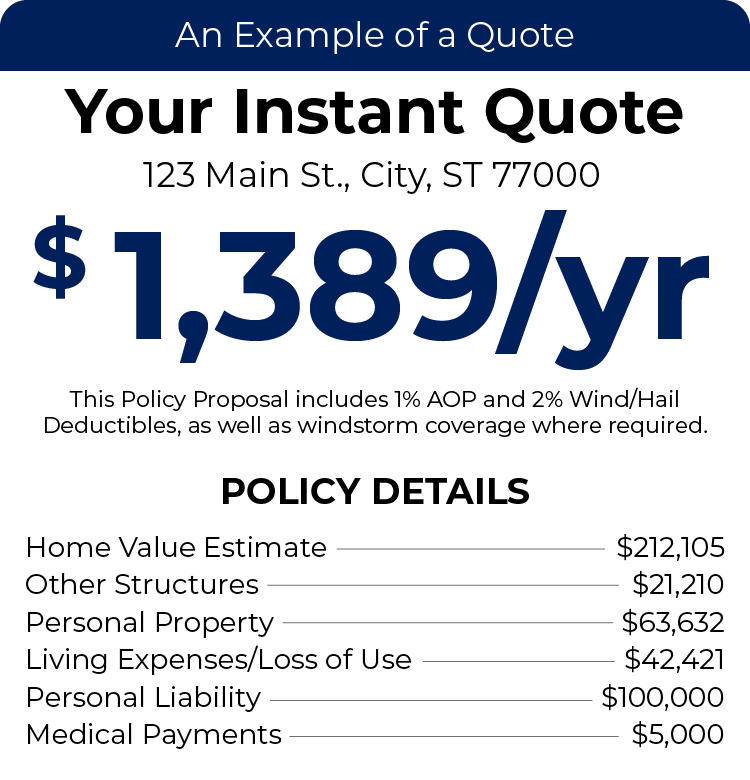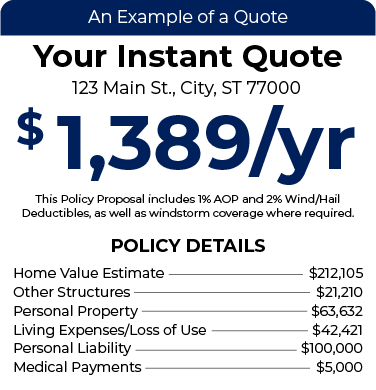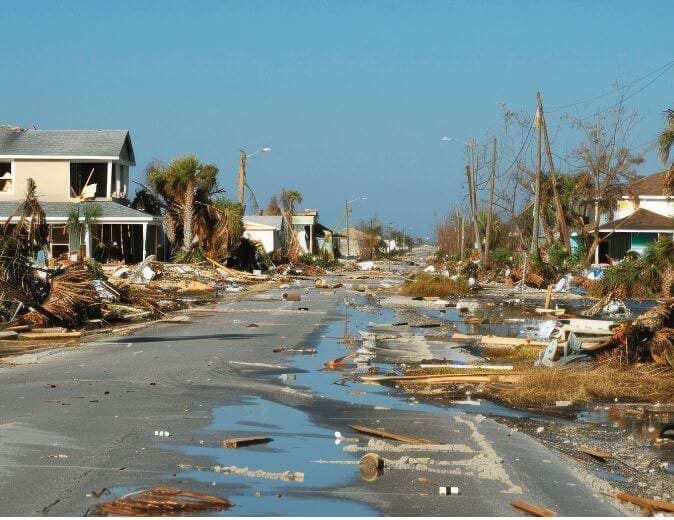Instant Home Insurance Quote
All We Need Is Your Address, NO BS!

Florida Windstorm Insurance: A Comprehensive Guide to Protecting Your Home
Florida is undeniably one of the most beautiful states in the U.S., with its miles of stunning coastline, balmy weather, and endless sunshine. But, as most Floridians know all too well, living in paradise comes with a price — the ever-present threat of hurricanes and windstorms. Whether you’re a lifelong resident or new to the state, understanding the importance of Florida windstorm insurance is crucial.
But what exactly is windstorm insurance? And why is it so essential for homeowners in Florida? Let’s dive into the details.
Key Takeaways
- Essential Coverage for Florida Homeowners: Florida’s vulnerability to hurricanes and tropical storms makes windstorm insurance a critical coverage option. Standard homeowner policies may not cover wind damage, making windstorm insurance essential for protecting your property from high winds.
- Windstorm vs. Flood Coverage: While windstorm insurance covers damage caused by high winds, it does not cover flooding caused by storm surges or heavy rain. Homeowners need separate flood insurance for complete protection in the event of a hurricane.
- Cost-Saving Strategies: Homeowners can lower the cost of windstorm insurance through mitigation efforts like installing storm shutters, increasing deductibles, and taking advantage of the Florida Wind Mitigation Program, which rewards storm-proofing improvements with potential discounts.
Table of Contents
- Why Windstorm Insurance Is a Must in Florida
- What Does Windstorm Insurance Cover?
- What Windstorm Insurance Doesn’t Cover
- Do You Really Need Windstorm Insurance?
- How Much Does Windstorm Insurance Cost in Florida?
- Saving Money on Florida Windstorm Insurance
- Windstorm Insurance and the Florida Wind Mitigation Program
- How to Choose the Right Windstorm Insurance Policy
- Get Started With Florida Windstorm Insurance
- Florida Windstorm Insurance FAQs
Why Windstorm Insurance Is a Must in Florida
If you’ve lived here for even a short time, you’ve likely heard about the sheer power of Florida’s hurricane season. The state’s geographical location makes it particularly vulnerable to tropical storms and hurricanes that can cause catastrophic wind damage. It’s not just the rain and flooding — the winds can reach speeds of over 150 mph in extreme cases, uprooting trees, tearing off roofs, and even flattening homes.
While standard homeowners insurance policies might provide some coverage for wind damage, it’s often not enough — or, in some cases, completely excluded. That’s where windstorm insurance comes in. This coverage is designed specifically to protect your home and belongings from the damage caused by high winds, making it a critical policy for any Florida homeowner.
What Does Windstorm Insurance Cover?
Windstorm insurance typically covers the damage caused by strong winds during hurricanes, tropical storms, or tornadoes. This could include structural damage to your home, such as a roof being ripped off or windows shattering. It can also cover damage to personal belongings inside the home due to wind-driven rain entering through compromised areas of the structure.
But here’s where things can get a bit tricky: not all policies are created equal, and coverage can vary significantly depending on your insurer and specific location. In some cases, windstorm insurance is a standalone policy; in others, it’s a separate rider attached to your standard homeowners insurance policy. Florida homeowners, especially those in coastal areas, should ensure they fully understand the extent of their coverage.
What Windstorm Insurance Doesn’t Cover
It’s important to note that flooding caused by storm surges or heavy rains isn’t covered by windstorm insurance. For that, you’ll need a separate flood insurance policy. This is a common point of confusion for homeowners, especially after a hurricane, when both wind and water damage can occur simultaneously.
Do You Really Need Windstorm Insurance?
This is a question many homeowners ask themselves, particularly if they’ve never personally experienced a hurricane. The answer? Absolutely. The unpredictable nature of Florida’s weather means you could go years without a major storm, only to have one devastating hurricane upend everything in a single day. And, considering that Florida has been hit by some of the most destructive hurricanes in U.S. history, it’s not a risk worth taking.
Without windstorm coverage, you’re left to foot the bill for repairs on your own — and trust me, the costs can be astronomical. Think about it: repairing a roof alone can set you back tens of thousands of dollars, not to mention replacing windows, siding, or even an entire home. Windstorm insurance provides that financial safety net, giving you peace of mind during the hurricane season.
How Much Does Windstorm Insurance Cost in Florida?
Ah, the million-dollar question—or hopefully not that much! The cost of windstorm insurance varies depending on several factors:
- Location: Are you near the coast? If so, your premium will likely be higher. Coastal areas face the brunt of most storms, and insurers see them as higher risk.
- Home Construction: Is your home built to withstand high winds? Features like hurricane shutters, impact-resistant windows, and a reinforced roof can lower your premium.
- Deductibles: Windstorm policies usually have a separate deductible, often a percentage of your home’s insured value. For example, if your home is insured for $200,000 and your windstorm deductible is 5%, you’d be responsible for $10,000 before your insurance kicks in.
Saving Money on Florida Windstorm Insurance
There are a few ways to lower the cost of your windstorm insurance:
- Mitigation Efforts: Installing hurricane shutters, reinforcing your roof, or upgrading to impact-resistant windows can qualify you for discounts. Many insurers offer credits for these types of improvements.
- Higher Deductibles: Opting for a higher deductible can reduce your monthly premium. However, be sure you can afford the out-of-pocket cost if you ever need to file a claim.
- Bundling Policies: Some insurance companies offer discounts if you bundle windstorm insurance with other types of coverage, like homeowners or auto insurance.
Windstorm Insurance and the Florida Wind Mitigation Program
One way Floridians can make their homes more resilient—and possibly save on insurance premiums—is by taking advantage of the Florida Wind Mitigation Program. This program offers financial incentives for homeowners who upgrade their homes with wind-resistant features, like storm shutters or roof reinforcements. Think of it as a way to storm-proof your house and lower your insurance costs all at once.
How to Choose the Right Windstorm Insurance Policy
Choosing a windstorm insurance policy can feel overwhelming, especially when you’re staring at a policy document filled with jargon. So how do you find the right one?
- Assess Your Risk: If you live near the coast or in a region prone to severe storms, you’ll want more robust coverage. Think about the frequency and severity of storms in your area.
- Get Multiple Quotes: Don’t just settle for the first policy you come across. Shop around, compare quotes, and read customer reviews. Insurers have different ways of assessing risk, and their prices can vary widely.
- Understand Your Deductible: A higher deductible means lower premiums, but it also means more out-of-pocket costs when you file a claim. Make sure your deductible fits your budget.
- Check for Discounts: Some insurers offer discounts if you’ve taken steps to storm-proof your home. Ask about these options to lower your premium.
Get Started With Florida Windstorm Insurance
Living in Florida means living with the threat of hurricanes and severe storms. While you can’t control the weather, you can control how well-protected your home is. Windstorm insurance offers peace of mind, ensuring that when the next big storm hits, you’re not left with a massive repair bill. Take the time to assess your home’s risk, compare policies, and invest in mitigation measures. In the long run, windstorm insurance is an investment in the safety and security of your home—and that’s something you can’t put a price on.
And, if you’re still wondering, “Do I really need windstorm insurance?” The short answer: In Florida? Absolutely.
At TGS Insurance Agency, we specialize in helping Florida homeowners find the right windstorm insurance coverage and ensure you and your property are protected when the next big storm rolls in. Our experienced agents can safeguard your home without breaking the bank, leaving you free to enjoy all the perks of Florida living with peace of mind.
Florida Windstorm Insurance FAQs
While not legally required, many mortgage lenders mandate windstorm insurance in high-risk areas. Given the frequency and severity of storms in Florida, having this coverage is highly recommended to protect your property from costly wind damage.
Standard homeowners insurance might include limited wind damage coverage or exclude it entirely. Windstorm insurance specifically covers damage from high winds caused by hurricanes, tropical storms, and tornadoes, offering more comprehensive protection in storm-prone areas.
Yes, by implementing mitigation efforts such as installing hurricane shutters or reinforcing your roof, you may qualify for discounts. You can also reduce premiums by opting for a higher deductible or bundling policies with the same insurer.






































































